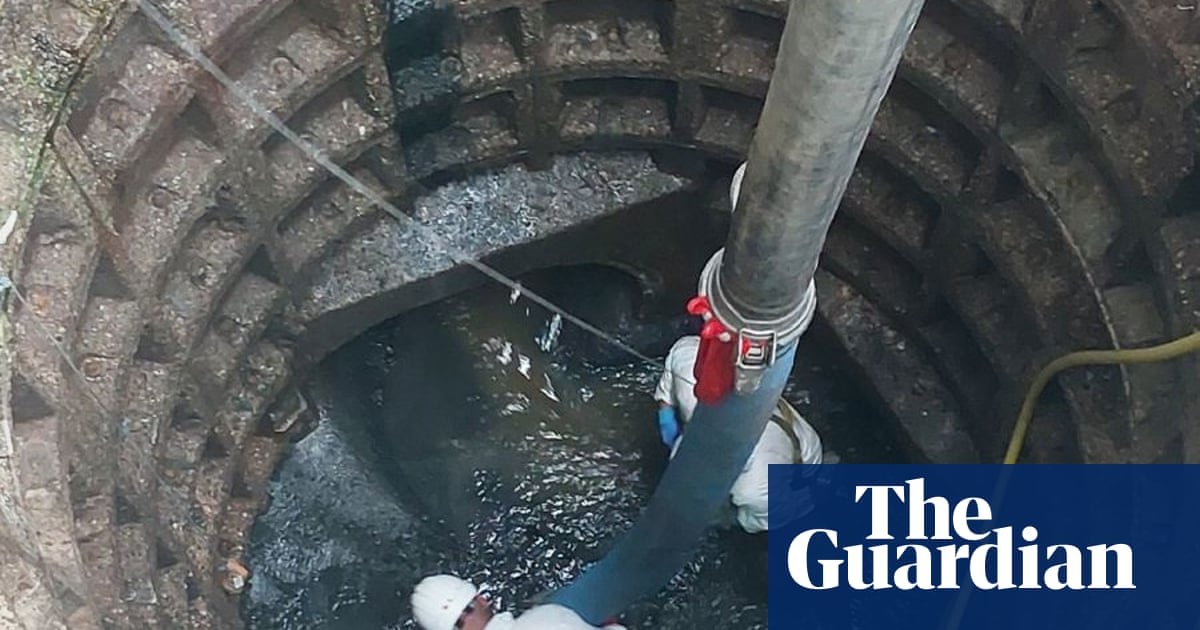A team of water engineers have spent a month blasting and chiselling a 100-tonne fatberg loose from under the streets of west London.
The blockage consisting mainly of wet wipes glued together by congealed fat, oil and grease, was the equivalent in mass of eight doubledecker buses, stuck 10 metres below street level.
Thames Water has circulated details of the mammoth clean-up job to mark a month-long national campaign to raise awareness of how substances and items tipped down drains affect our rivers, seas and wider environment.
It comes as Thames Water’s creditors ask the water industry regulator, Ofwat, for up to 15 years leniency from rules on pollution of England’s waterways, arguing it would be impossible for the company to make upgrades across London and south-east England more quickly because of the scale of the work needed after years of neglect. Thames Water has been crippled by huge debts built up over two decades by owners who have been criticised for paying out dividends without investing enough in its leaking pipes and malfunctioning treatment works.
Fatbergs are formed when oil, grease and fat poured down drains combine with non-biodegradable items such as wet wipes, nappies and cotton buds. If left to grow, they can cause flooding and widespread effluent pollution when sewers back up.
It was after such an incident that investigators discovered the latest fatberg lurking 10 metres below the streets of Feltham. It was composed primarily of wet wipes, compacted into a fibrous and gelatinous mass blocking the flow through a major sewer pipe beneath the district.
The solid mass consisted mainly of wet wipes held together by fat, oil and grease. Photograph: Thames Water/PA
Specialist engineers in protective gear entered the sewers in a two-person safety cage lowered into a maintenance-hole chamber measuring 3 metres in diameter. Working deep underground, they used picks, shovels and high-pressure hoses to dislodge the vile accumulation from along 125 metres of sewer main, before it was sucked to the surface and trucked away for disposal at a landfill site as toxic waste.
“The clearance of this fatberg was hugely complex for our team of engineers,” said Alexander Dudfield, engagement lead for network protection at Thames Water.
“But while some blockages in our biggest sewers can weigh as much as 25 elephants, we must not forget most blockages occur in local pipes – often narrower than a mobile phone and usually caused by a few households.
“When these pipes get blocked, we can’t simply switch off the sewage. It backs up and must come out somewhere, whether that’s roads, rivers or even people’s homes.
“The consequences can be devastating.”
Thames Water says it spends £18m clearing 3.8bn wipes from its network every year. So far this year, the company said it had cleared 28,899 rag blockages, which were primarily made up of wet wipes; 14,810 fat, oil and grease blockages; and 686 third-party blockages, made up of concrete and other sewer-blocking materials.
The Feltham fatberg fiasco followed a recent announcement by the government that it would introduce legislation to ban wet wipes that contain plastic. But some problems remain more stubborn: a recent survey found that 48% of Britons still pour fats, oils and grease down the drain.
